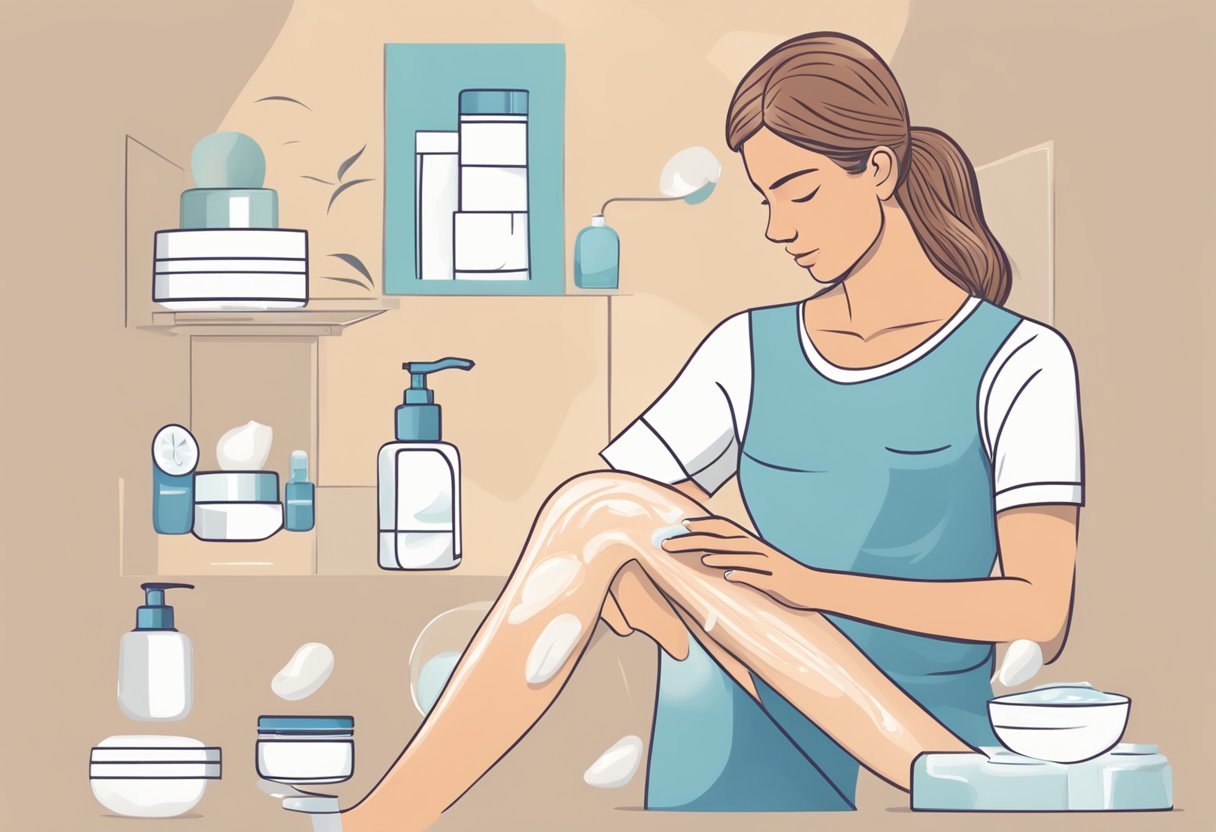Dry Skin
Symptoms, Causes, and Home Remedies
Discover > Health Conditions > Dry Skin: Symptoms, Causes, Home Remedies
Dry skin is a common issue faced by people of all ages, often resulting in uncomfortable symptoms such as itching, flaking, and tightness. Identifying the causes of dry skin, as well as understanding its symptoms, can help individuals better manage this condition and find relief through various home remedies. In this article, we will discuss the various symptoms associated with dry skin, the factors that contribute to it, and provide some effective home remedies that can alleviate the discomfort.
The skin, being the largest organ in the human body, plays a crucial role in protecting us from external factors and maintaining a healthy appearance. However, when the skin loses its ability to retain moisture, it becomes dry and prone to several complications. Factors that can lead to this condition include aging, environmental conditions, and certain medical conditions. By taking the appropriate steps to identify these triggers, individuals can prevent the unpleasantries accompanying dry skin.
In addition to tackling the underlying causes of dry skin, home remedies can offer a convenient and cost-effective solution to alleviating the symptoms. From natural moisturizers to lifestyle adjustments, there are numerous ways to address dry skin and improve overall skin health. As we delve further into the topic, we will provide practical tips and remedies that cater to the individual needs of those struggling with dry skin.
Understanding Dry Skin
Dry Skin Overview
Dry skin, also known as xerosis, is a common skin condition characterized by a lack of moisture in the skin. This can occur due to various factors, such as environmental conditions, aging, and skin conditions like eczema or psoriasis. Though it can affect people of all ages, the risk of developing dry skin increases with age.
Symptoms of Dry Skin
Itching: Itching is often a key indicator of dry skin and may range from mild to severe.
Flaking: The skin may shed in the form of small, white flakes.
Redness: Dry skin can cause a reddish hue, particularly in areas with the most irritation.
Cracking: Severe dry skin may lead to cracks, which can be painful and prone to infection.
Rough texture: Affected areas of skin may feel rough and uneven to the touch.
Risk Factors
Several risk factors can increase the likelihood of developing dry skin, including:
Age: Older individuals tend to have thinner skin and less natural oil production, leading to increased dryness.
Climate: Living in a dry or cold climate can deplete the skin's moisture.
Occupation: Jobs that require frequent handwashing or exposure to chemicals can contribute to dry skin.
Genetics: Individuals with a family history of dry skin or related skin conditions are more likely to experience it themselves.
Complications
If not addressed or treated properly, dry skin can lead to the following complications:
Infections: Cracks or open sores in the skin can serve as entry points for bacteria, leading to infection.
Inflammation: Persistent dry skin can cause inflammation, making the skin appear red and swollen.
Eczema: Those with chronic dry skin may develop eczema, a condition that causes red, itchy patches on the skin.
Psychological distress: The appearance and discomfort of dry skin can lead to self-consciousness and lowered self-esteem.
To minimize the risk of these complications, it is important to identify the underlying cause of dry skin and implement appropriate home remedies or seek professional treatment as needed.
Causes of Dry Skin
Medical Conditions
Several underlying medical conditions can contribute to dry skin. Diabetes, kidney disease, and hypothyroidism are common disorders that can cause severe dryness. Additionally, certain medications may have side effects that include dry skin. It is important to consult a healthcare professional if you suspect a medical condition is contributing to your dry skin.
Environment and Weather
The environment and weather are major factors that can influence the condition of your skin. In dry or cold climates, skin can become more susceptible to dryness and cracks. This is often due to low humidity and indoor heating, which remove moisture from the air. In the summer months, exposure to excessive heat and sun can result in dry skin as well, as perspiration evaporates and takes moisture with it.
Influence of Lifestyle Choices
Personal habits and lifestyle choices can have a significant impact on skin health. Regularly consuming alcohol and caffeine can dehydrate the skin, as these diuretics cause the body to lose fluids. Additionally, smoking can damage the skin's surface and contribute to dryness. A diet lacking in essential nutrients can also lead to malnutrition and dry skin. To maintain healthy skin, individuals should prioritize a balanced diet, sufficient hydration, and avoid excessive intake of potentially harmful substances.
Effects of Aging
As individuals age, the skin's natural oil production decreases, leading to dryness. The decreasing amount of collagen and elastin in the skin can reduce its ability to retain moisture effectively. This process can be exacerbated by hormonal changes and other age-related factors. It is essential to adjust skincare routines as we age to address the evolving needs of the skin and maintain optimal moisture levels.
Preventing Dry Skin
Home Remedies
1. Limit bath and shower time: It's essential to limit your time in the shower or bath to under 15 minutes, as longer exposure to water can strip the skin of its natural oils.
2. Use gentle, moisturizing soaps: Choose mild, fragrance-free soaps that are specifically designed for dry skin. Avoid harsh soaps and antibacterial cleansers that can further deplete the skin's moisture.
3. Apply moisturizers immediately after bathing: To lock in moisture, pat your skin dry gently and apply a thick moisturizer or ointment within a few minutes of stepping out of the bath or shower.
4. Invest in a room humidifier: Adding moisture to the air can help prevent dry skin and improve skin hydration. Place a humidifier in your bedroom or other areas where you spend significant time.
5. Stay hydrated: Drink plenty of water throughout the day, aiming for at least 8 cups per day. Additionally, consume foods with high water content, such as fruits and vegetables, to help maintain internal hydration.
Lifestyle Changes
6. Wear appropriate clothing: Choose fabrics that are gentle on the skin, such as cotton or silk. Avoid rough, scratchy materials like wool that can irritate dry skin.
7. Protect your skin from the sun: Sun exposure can cause dry skin and premature aging. Apply a broad-spectrum sunscreen with an SPF of at least 30 before going outdoors.
8. Avoid excessive heat exposure: Limit your time in hot environments, as excessive heat can further strip the skin of moisture. This includes saunas, hot tubs, and areas with high temperatures.
9. Practice stress management techniques: Stress can negatively affect the skin, leading to dryness and other issues. Consider incorporating stress-reducing techniques into your daily routine, such as meditation, yoga, or exercise.
10. Maintain a well-balanced diet: Eating a diet rich in essential nutrients helps promote healthy skin. Include foods high in omega-3 fatty acids, vitamins, and minerals, such as fish, nuts (), and leafy greens. Avoid excessive caffeine and alcohol consumption, as they can contribute to dehydration.
By adhering to these home remedies and lifestyle changes, you can effectively prevent dry skin and maintain the health of your skin.
Treatments for Dry Skin
There are several treatment options available to alleviate dry skin, from over-the-counter solutions to prescription treatments and natural remedies. The appropriate treatment depends on the severity and persistence of your dry skin symptoms. In this section, we will explore each of these methods in detail.
Over the Counter Options
Moisturizers play a crucial role in treating dry skin. They help retain moisture and provide a protective barrier. When choosing a moisturizer, you want to look for creams, ointments, or lotions with ingredients such as:
Petroleum jelly — an occlusive agent that locks in moisture
Glycerin — a humectant that attracts and retains moisture
Hyaluronic acid — a moisturizing agent that holds water
When using any of these products, it is essential to apply them frequently to maintain their effectiveness.
For more severe cases, topical steroid creams may temporarily reduce itching and inflammation. They should be used with caution and according to the label's instructions, as improper use could lead to side effects.
Prescription Treatments
If over-the-counter treatments prove ineffective, consult a healthcare professional for prescription options. These may include:
Higher-strength topical steroids for more potent anti-inflammatory action.
Topical medications such as calcineurin inhibitors or PDE4 inhibitors to help manage inflammation and itching.
Keep in mind that prescription treatments often involve a healthcare professional's supervision to ensure the proper use and monitor potential side effects.
Natural Remedies
In addition to conventional treatments, some home remedies may provide relief from dry skin symptoms. A few popular options include:
Coconut oil — Known for its moisturizing and anti-inflammatory properties, apply it directly to the skin as a natural alternative to lotions or creams.
Oatmeal — Its soothing and anti-inflammatory characteristics make it a useful addition to baths or homemade masks.
Avoiding harsh soaps — Opt for mild, fragrance-free soaps to minimize skin irritation.
Lastly, remember that self-care plays an essential role in managing dry skin. Keep yourself hydrated, minimize exposure to hot water, and use a humidifier to maintain optimal indoor humidity. These steps, combined with the treatments mentioned above, can help alleviate and prevent dry skin symptoms.
Protection from Further Dryness
Taking precautions to protect your skin from further dryness is essential. Properly guarding against environmental factors and adjusting your lifestyle can efficiently help minimize skin dryness. Consider implementing the following tips to maintain healthy and hydrated skin.
Avoid Hot Showers: Opt for warm or lukewarm water when bathing. Hot water tends to strip away the skin's natural oils, resulting in even drier skin.
Choose Mild, Fragrance-Free Soaps: Some soaps can be harsh on the skin, causing irritation and dryness. Opting for gentle, fragrance-free cleansers helps in preserving the skin's natural moisture.
Adjust to Weather and Environment: Cold weather and central heating can contribute to skin dryness. Ensure using a good moisturizer regularly, and consider using a humidifier in your home to maintain an ideal level of humidity.
Wear Protective Clothing: Protect your skin from harsh environmental factors, such as cold winds, by wearing gloves and a scarf to cover exposed skin.
Apply Sunscreen: Excessive sun exposure can lead to skin dryness. Use a broad-spectrum sunscreen with at least SPF 30 even in cooler months. Choose a hydrating sunscreen to provide additional moisture.
Use Moisturizers: Applying fragrance-free, oil-based moisturizers keeps your skin hydrated and nourished. Choose a product that suits your skin type and apply it after showering or washing your hands.
Incorporating these protective measures into your daily routine can help to prevent further dryness and maintain healthy, moisturized skin. By being mindful of factors like moisture, weather, and the environment, you can efficiently tackle dry skin challenges and avoid potential infections.
Interactions with Common Skin Conditions
Dry Skin and Eczema
Eczema, also known as atopic dermatitis, is a common skin condition characterized by inflammation, redness, and itchy patches of skin. Dry skin often plays a crucial role in eczema, as it can lead to a weakened skin barrier, leaving it more susceptible to irritants and allergens. To manage eczema, a proper skin care routine that includes gentle cleansers and regular moisturizing is necessary. Additionally, avoid known irritants and allergens, and apply anti-inflammatory creams when needed.
Dry Skin and Psoriasis
Psoriasis is an inflammatory skin condition that occurs when skin cells multiply faster than normal, resulting in raised, red patches covered with a silvery scale. Dry skin can exacerbate the symptoms of psoriasis, such as itching and flaking. Proper skin care for those with psoriasis includes:
Regular moisturizing with fragrance-free, thick creams
Using gentle, hypoallergenic personal care products
Taking lukewarm baths with added salts, oils, or milks
Avoiding hot water and harsh soaps that can irritate the skin
It's also essential to seek professional advice for additional treatment options, such as topical medications or phototherapy, to manage psoriasis effectively.
Dry Skin and Acne
Acne, characterized by pimples, blackheads, and whiteheads, is often associated with oily skin. However, dry skin can also interact with acne, especially if excessive drying or over-exfoliation occurs. In these cases, the skin may produce more oil to compensate, leading to more acne. For individuals with dry skin and acne, proper skin care includes:
Using a gentle cleanser to remove dirt, oil, and makeup without stripping the skin
Hydrating the skin with non-comedogenic moisturizers to avoid clogging pores
Selecting acne treatments suitable for dry skin, such as products with lower concentrations of active ingredients
Exfoliating the skin gently, not more than once or twice a week, to remove dead skin cells without causing excessive irritation
Combining these practices with any appropriate professional treatments for acne management can result in healthier-looking skin.
Role of Diet and Hydration in Skin Health
The role of diet and hydration is crucial in maintaining and enhancing skin health. A well-balanced diet and proper hydration are essential building blocks for healthy skin, as they provide the necessary nutrients and moisture required to maintain its suppleness and elasticity.
One vital aspect of skin health is hydration. The skin is approximately 64% water, and therefore, it requires sufficient water intake to remain properly hydrated. Drinking an adequate amount of water daily, which is approximately eight 8-ounce glasses, is essential for overall skin health. In addition to contributing to skin elasticity, hydration also helps in flushing out toxins from the body that could otherwise cause breakouts and other skin issues.
Dehydration, on the other hand, can lead to various skin problems, including itchiness, dullness, and the appearance of fine lines and wrinkles. It is important to note that factors such as caffeine and alcohol consumption, climate, and physical activities can influence the body's hydration status, necessitating adjustments in water intake.
A healthy diet also plays a significant role in skin health. Incorporating fruits, vegetables, whole grains, lean proteins, and healthy fats in one's diet can contribute to better skin health. Some specific dietary components that are beneficial for the skin include:
Antioxidants: These compounds help protect the skin from damage caused by free radicals. Foods rich in antioxidants include berries, leafy greens, nuts (how long do walnuts last?), and seeds.
Healthy fats: Essential fatty acids, such as omega-3 and omega-6, contribute to skin hydration and a healthy skin barrier. These fats can be found in sources such as fatty fish, flaxseeds (how long do flaxseeds last?), and walnuts.
Vitamins: Vitamins A, C, and E are essential for skin health, playing important roles in collagen production, cell regeneration, and skin repair. Foods rich in these vitamins include carrots, citrus fruits, and almonds (how long do almonds last?).
It is worth mentioning that certain dietary choices can potentially harm the skin. High sugar consumption, for instance, can trigger inflammation and contribute to collagen breakdown, leading to accelerated skin aging. Therefore, it is essential to monitor and control the intake of sugar and processed foods in the diet.
In conclusion, adopting a healthy diet and staying properly hydrated have a considerable impact on skin health. By incorporating nutrient-rich foods and ensuring adequate water intake, individuals can support their skin's ability to maintain a vibrant and healthy appearance.
Frequently Asked Questions
When to See a Doctor?
It is advisable to consult a doctor or a dermatologist if the dry skin persists despite trying home remedies or over-the-counter moisturizers. Seek medical attention if the following symptoms are observed:
Severe itching that affects daily activities
Skin infection signs such as redness, pain, or pus
Dry skin accompanied by fever or weight loss
Large, peeling, or cracking areas on the skin
No improvement in skin condition after two weeks
What are Good Products for Dry Skin?
When choosing products for dry skin, it is important to select those that promote hydration and benefit overall skin health. The following list includes products that can effectively combat dryness:
Moisturizers: Opt for a cream or ointment with ingredients like hyaluronic acid, ceramides, or glycerin. These substances draw moisture to the skin and lock it in.
Cleansers: Use gentle, soap-free cleansers that do not strip the skin's natural oils.
Facial oils: Apply a facial oil containing natural oils such as jojoba, rosehip, or marula to enhance moisture retention and repair the skin's barrier.
Sunscreen: Protect the skin from sun damage by using a broad-spectrum sunscreen with at least SPF 30 every day.
Conclusion
In summary, dry skin is a common condition that can be caused by various factors, such as external conditions, aging, genetics, and some medical conditions. Its symptoms may include itching, flaking, redness, and tightness, which can significantly affect an individual's daily comfort and confidence.
To alleviate discomfort and treat dry skin, here are some recommended home remedies:
Moisturizing: Regularly applying a fragrance-free moisturizer can help maintain and replenish the skin's natural moisture barrier.
Lukewarm showers: Opt for short showers or baths with lukewarm water, as hot water can strip away essential oils from the skin.
Gentle soaps: Use gentle, fragrance-free soaps that are made for sensitive skin to avoid irritation.
Humidifiers: Increasing indoor humidity by using a humidifier can help keep the air moist, which can benefit the skin.
Proper clothing: Wear soft fabrics like cotton and avoid rough materials, such as wool, that can aggravate dry skin.
Adopting these practices can help enhance skin health and minimize discomfort. However, if the dry skin symptoms persist or worsen, it is important to consult with a healthcare professional or dermatologist. They may recommend specialized treatments or identify underlying medical conditions that contribute to dry skin, ensuring a more targeted approach in managing this condition.
#develop dry skin #itchy skin #diagnose dry skin #flaky skin #moisturizing cream #apply moisturizer #extremely dry skin #contact dermatitis #dry skin treated #dry skin patches #relieve dry skin






